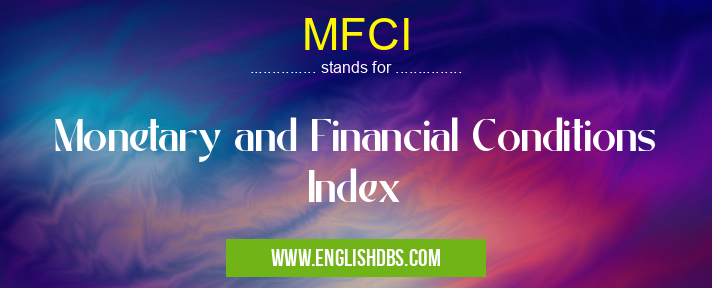What does MFCI mean in FINANCE
The Monetary and Financial Conditions Index (MFCI) is an invaluable tool for gauging the overall economic health of a given region or nation. It is a composite index that provides an objective measure of the prevailing level of banking, investment, and financial conditions in an area. By taking into account a variety of factors, including interest rates, exchange rates, stock prices, and market volatility, the MFCI gives analysts and policymakers insight into how well markets are functioning. With this information in hand, they can make informed decisions about how to maintain monetary and financial stability in the country or region.

MFCI meaning in Finance in Business
MFCI mostly used in an acronym Finance in Category Business that means Monetary and Financial Conditions Index
Shorthand: MFCI,
Full Form: Monetary and Financial Conditions Index
For more information of "Monetary and Financial Conditions Index", see the section below.
What it Measures
The MFCI looks at two separate indicators to gauge market performance. The first is quantitative factors such as interest rates, exchange rates, capital flows, and money supply; these all reflect the liquidity conditions in an economy. The second measures qualitative factors such as market sentiment and investor confidence; these provide an indication of risk taking activity in the market. Together these two indicators give a comprehensive view of current economic conditions on both macro-economic scale as well as micro-level.
How it's Used
The MFCI can be used by central banks to assess the effectiveness of their monetary policy decisions. It also provides insight into whether market participants are trading in line with expected trends or if there is risk associated with significant deviations from predicted behavior. In addition to providing a look at current economic trends, analysts use the MFCI to make forecasts about future movements in markets based on past behavior. This allows them to anticipate disruptive events before they occur so that actions can be taken proactively to limit damage.
Essential Questions and Answers on Monetary and Financial Conditions Index in "BUSINESS»FINANCE"
What is a Monetary and Financial Conditions Index (MFCI)?
The Monetary and Financial Conditions Index (MFCI) is an index that measures the overall state of economic health. It indicates how monetary and financial conditions are affecting economic activity across different countries, regions, and asset classes. The MFCI takes into account indicators such as credit spreads, interest rates, consumer and business confidence, exchange rates, foreign direct investment flows, capital flows, and liquidity in financial markets.
What information does the MFCI measure?
The MFCI measures various macroeconomic indicators that provide insight into current monetary and financial conditions. These include credit spreads, interest rates, consumer and business confidence indices, exchange rates, foreign direct investment flows, capital flows, liquidity in financial markets, money supply growth rates and inflation expectations.
How is the MFCI calculated?
The MFCI is calculated by taking into account a range of macroeconomic indicators to create a composite score for each country or region covered in the index. These indicators are weighted according to their importance to measure overall economic health.
How can investors use the MFCI?
Investors can use the MFCI as a tool to track trends in both macroeconomic conditions and financial markets across different countries or regions. By understanding the direction of these factors over time they can gain further insight into future market movements.
Who provides data used by the MFCI?
The data used by the MFCI is provided by various central banks and government agencies including the US Federal Reserve Board (FRB), Bank of England (BoE), European Central Bank (ECB), Bank of Japan (BoJ) as well as other international organisations such as OECD and IMF.
What time period does the index cover?
The index covers an outlook period of 9 months which denotes how long it will take for changes in current conditions to impact economies around the world..
Can I compare regional differences with this index?
Yes you can compare regional differences with this index. The index covers dozens of countries from all around the world allowing users to compare areas on a global scale.
What type of analysis can be done using this index?
This index allows for analysis on monetary trends across countries such as changes in inflation expectations or levels of consumer spending; analysis on different sectors such as housing market performance or manufacturing output; examination of geopolitical events such as Brexit or trade tensions between large economies; comparison between stock indexes around world; charting foreign currency movements.
Is there any historic data available on this index?
Yes there is historic data available on this index allowing users to analyse past performance over longer periods.
Final Words:
In summary, the Monetary and Financial Conditions Index (MFCI) is a powerful tool used by policymakers and analysts alike to gain insight into how well markets are performing both domestically and abroad. By examining quantitative figures like interest rates and exchange rates alongside qualitative measures like investor confidence levels, this index provides users with actionable intelligence that helps them stay ahead of potential disruptions while maintaining monetary and financial stability within their region or country.
